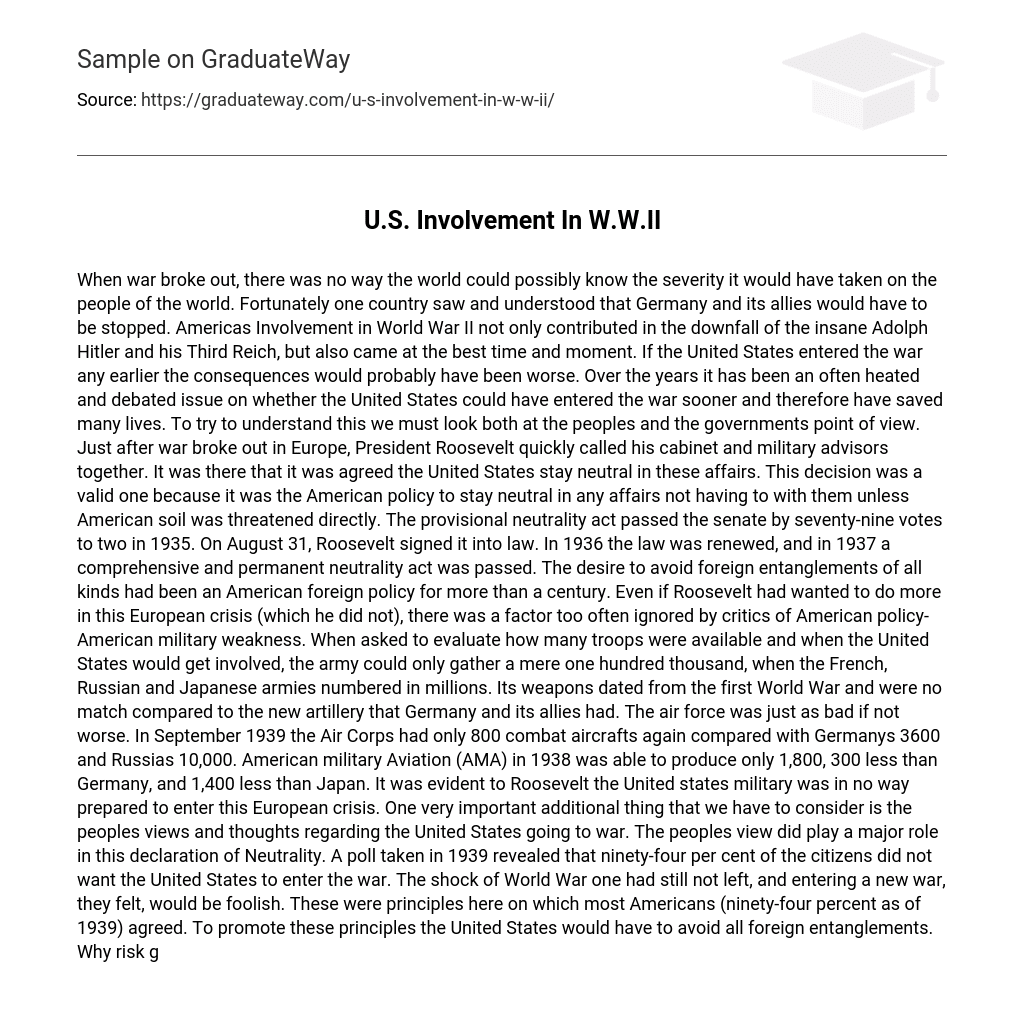Despite the global uncertainty caused by the outbreak of war, one nation realized the importance of stopping Germany and its allies. The involvement of the United States in World War II played a crucial role in defeating Adolf Hitler and his Third Reich. The timing of America’s entry into the conflict held great significance; if they had joined earlier, the consequences could have been even more severe. There has been an ongoing debate on whether the United States could have intervened earlier and potentially saved lives. To fully understand this matter, it is important to take into account both public opinion and government perspective.
After the war broke out in Europe, President Roosevelt acted swiftly by calling a meeting with his cabinet and military advisors. The purpose of this gathering was to discuss and agree on the importance of the United States maintaining neutrality in these events. The decision was justified based on America’s existing policy of not interfering in unrelated matters unless there was a direct threat to American territory.
In 1935, the provisional neutrality act received significant support in the senate, with seventy-nine votes in favor and only two opposing votes. As a result, Roosevelt officially made it into law by signing it on August 31st.
The law was renewed in 1936 and a comprehensive and permanent neutrality act was passed in 1937. The American foreign policy of avoiding foreign entanglements had been in place for over a century. Critics often overlook the significant factor of American military weakness. Despite any desire Roosevelt may have had to do more in the European crisis (which he did not), the American army could only gather a mere one hundred thousand troops, compared to the millions in the French, Russian, and Japanese armies. The American weapons were outdated from World War I and could not compete with Germany and its allies’ new artillery. The air force was equally deficient, if not worse.
In September 1939, the Air Corps had 800 combat aircraft, while Germany had 3,600 and Russia had a staggering 10,000. The American military Aviation (AMA) produced only 1,800 aircraft in 1938, which was 300 less than Germany and an astonishing 1,400 less than Japan. Roosevelt acknowledged that the United States military was unprepared for the unfolding European crisis. Additionally, public opinion played a significant role in determining whether the United States should enter the war. A poll conducted in 1939 revealed that an amazing ninety-four percent of citizens were against US involvement in the war.
In 1939, the American majority (94%) opposed involvement in another war due to concerns about World War One’s lasting impact. Accordingly, the United States sought to distance itself from foreign affairs to align with public opinion and national policy, particularly given the insufficient state of the American military.
President Roosevelt’s decision to remain neutral was influenced by multiple factors, one of which was the American Economy. It was vital to preserve the well-being of the American economy regardless of external circumstances. President Roosevelt firmly believed that the United States would continue to prosper economically, whether Europe went to war or not. Gold was being sent from Europe’s capitals to America while daily orders for various equipment and supplies were flowing into the country. Additionally, America was in the process of constructing a battleship for Stalin. Throughout the 1930s, Germany and Japan, among other nations, engaged in unrestricted trade with the United States. Up until 1941, Japan relied on fuel oil and scrap iron as part of this trading relationship.
During the 1930s, American investments in Germany increased by forty percent, making it a crucial market for the United States. This growth was essential for restoring America’s prosperity after World War 1. The main concern for American businesses at that time was the potential exclusion of their goods from Europe and Asia by Japan and Germany, which would have greatly disadvantaged the United States economically.
If the United States had joined the war earlier, it would not be as prosperous now. America needed help from Germany and its allies to restore its economy during that time. Therefore, President Roosevelt did not want to go to war with all opposing powers because it would endanger both the American people and economy. This was crucial for a large and complex country like the United States at that time.
However, on December 6, 1941, the Japanese Air force attacked Pearl Harbor unexpectedly, completely destroying the port. As a result, President Roosevelt had no choice but to take action.
The United States was compelled to participate in the war because not doing so would have heightened its peril. Roosevelt saw the attack as an opportunity and supported it the following day. Congress unanimously authorized a declaration of war, with only one dissenting voice. Defending its soil, which had been threatened, became America’s highest priority. As a result, going to war became unavoidable in order to overthrow Nazi Germany’s rule. Hitler believed that America underwent social crises during the 1930s, which he used to justify his own worldview.
This misunderstanding also caused Japan to confront the United States in 1941. Had the United States joined the war at a different time, the outcomes could have been more serious. Franklin Delano Roosevelt, prioritizing the security of the republic, successfully protected it. President Roosevelt, guiding the United States throughout every phase, performed exceptionally well in engaging America in the war at the right moment.
Evidently, America joined World War 2 precisely to bring down Adolph Hitler and the third Reich. The United States’ participation in the war, although devastating to the people at Pearl Harbor and our country, couldn’t have happened at a more opportune moment.





